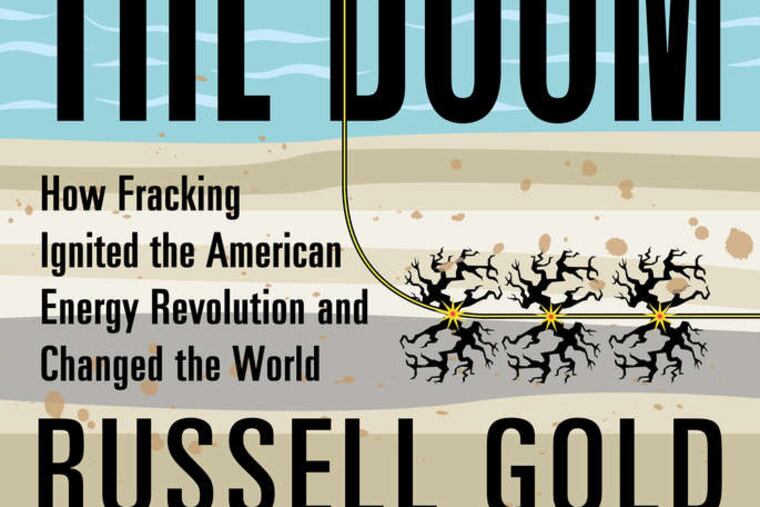Author to discuss the history of fracking
In 1973, Philadelphians Barbara and Stephen Gold became part-owners of a 100-acre property in Sullivan County, in the Endless Mountains region of north-central Pennsylvania.

In 1973, Philadelphians Barbara and Stephen Gold became part-owners of a 100-acre property in Sullivan County, in the Endless Mountains region of north-central Pennsylvania.
Its cabin was more than a vacation getaway. In an era of antigovernment protests, the politically passionate young urbanites figured, only partly in jest, that it could be a refuge should revolution and chaos come to the city.
Instead, a revolution came to Sullivan County. An energy revolution. The cabin sat atop one of the world's largest shale formations: the Marcellus.
A few years ago, Chesapeake Energy approached, wanting to drill for natural gas on the land the Golds and their friends bought.
As it happened, their son, Russell, a former Inquirer reporter, was now an energy reporter for the Wall Street Journal. Since 2002, he has covered the industry, one so transformative he sometimes refers to the United States as "Frackistan."
They asked his advice. The long version of his answer - to them, to the country - is his new book, The Boom: How Fracking Ignited the American Energy Revolution and Changed the World. He'll discuss it Thursday at the Central Library of the Free Library of Philadelphia.
Russell Gold, who grew up in Philadelphia and lives in Austin, Texas, said he felt compelled to write the book because "the discussion was so quickly descending into arguments and finger-pointing, and often poorly informed finger-pointing," by both industry and opponents.
The Boom takes us from the earliest fracking - 1860s oilmen dropped tiny bombs into wells to boost production - to the latest technologies, with a front-row seat for the fracking of a North Dakota well, the Irene Kovaloff 11-18H.
We meet the insiders, engineers to wildcatters, fracking pioneer George Mitchell to Chesapeake Energy founder and former chief executive Aubrey McClendon.
We learn how fracking caused a rift in the Sierra Club. Believing that natural gas use would help cut greenhouse gas emissions, former national president Carl Pope backed the industry and accepted McClendon's money. Other members worried about harmful local effects.
The fracking narrative is complex, like so many energy stories. "You can be scared of it, and you can celebrate it, and both are actually quite legitimate" points of view, Gold said in a recent interview.
What's different about shale gas is how quickly the field has developed.
The first modern frack well, he said, was drilled just 16 years ago. By 2013, more than 15 million Americans lived within a mile of a well that had been fracked in the last few years. In the U.S., the industry is drilling and fracking 100 wells a day.
What's also different is that energy extraction is occurring in our back yards, not in the Arctic or Nigeria. With that proximity, fracking has come "to embody one of the greatest environmental fears" of the 21st century, Gold writes. "The promise and peril of energy production is coming home."
While fracking "is providing an abundance of domestic energy, helping to drive a rebirth of manufacturing, and easing dependence on overseas energy peddlers ...," he writes, "it also requires turning whole counties into industrial zones, complete with fleets of trucks, air quality concerns, a disruption of nature, and fear that water aquifers will be poisoned."
The industry has raced "well ahead of a lot of questions," Gold said.
Such as: How much methane is leaking out? How do we stop it? What's the health impact of having dozens of wells nearby? Are they being constructed so they won't leak in 10 or 20 years?
Will we look back with relief or regret?
Gold concludes that "it's time to slow down. . . . If we blow it, we're never going to forgive ourselves."
As for his parents, their owner group decided to lease to the gas company. With other wells nearby, they would likely have all the problems anyway.
Barbara Gold, a pediatrician, and Stephen Gold, a disability rights lawyer, said they felt squeamish about taking what seemed like "blood money." The owners agreed to give half the money gained to local environmental groups. A quarter of it was held for post-drilling repairs to the property, if needed, and for annual testing of their well water and pond.
They kept the final quarter for themselves.
Today, two wells are on a pad about a quarter-mile from the cabin. The "pretty awful" drilling and fracking are over, Barbara Gold said. The wells are producing.
But they and their son still wonder if the job was done right. Will a nightmare emerge later?
"I moved from being somewhat negative about the whole thing to feeling . . . it's not going to go away," Barbara Gold said. "Let's just do it as safely and efficiently as possible."
215-854-5147 @sbauers